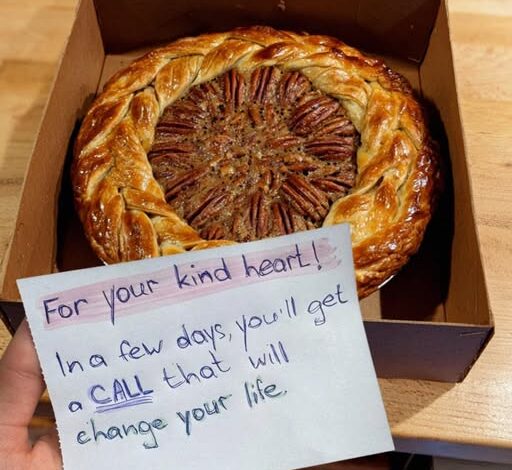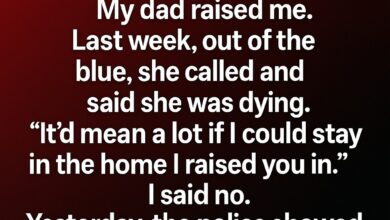
I Was Baking Pies for Hospice Patients – Then One Arrived for Me, and I Nearly Passed Out!
When I was sixteen, my world vanished in smoke. That night, I lost everything — my family, my home, and the version of myself that believed life was fair. What I didn’t know was that grief would eventually lead me to the kitchen, where flour, butter, and sugar became my language of love — and that one day, love would find its way back to me in the form of a single pie.
It was a brutally cold January night, the kind that makes windows sweat from the inside. I was curled up in bed, half-asleep with music in my ears, while my parents and grandpa laughed downstairs watching TV. Then came the smell — sharp, chemical, wrong. I yanked out my earbuds just as the fire alarm shrieked.
My dad burst into my room, his face pale and eyes wide. He didn’t say a word. He grabbed my arm, pulled me barefoot into the snow, and shoved me toward the front yard. Then he turned back for my mom and grandpa.
They never made it out.
The fire started in the kitchen, the place where my mom used to hum while cooking, where life always smelled warm and safe. It took everything — the walls, the photos, the savings, even the little ceramic horse my mom gave me when I was ten. Everything burned except me.
For a long time, I wished it had been me.
I ended up in a community shelter — a dorm for displaced youth. It wasn’t home, but it was warm. I shared a small room with a quiet girl who never spoke, used one of two bathrooms for twenty people, and tried to pretend I was okay. My only living relative, Aunt Denise, made it clear she wasn’t interested in taking me in. “I’m grieving too,” she said over the phone. “And I don’t have room for a teenager.”
But she somehow had room for my mother’s half of the insurance payout. She promised to “use it responsibly” — therapy for me, new clothes, maybe even a laptop for school. Instead, she bought herself a new car, a wine fridge, and what she called her “grieving wardrobe.” She told me expensive clothes helped her mourn with dignity.
I didn’t argue. I was too numb.
At the shelter, I focused on surviving. During the day, I buried myself in schoolwork, chasing scholarships like they were oxygen. At night, when the halls quieted, I took over the kitchen. It was old and battered — scratched counters, a half-broken oven — but it was mine after dark.
I started baking pies. Blueberry, apple, cherry, peach — whatever fruit I could afford with my small monthly aid check. I rolled out dough with an empty wine bottle I found in the trash and cut crust edges with a butter knife. My hands, which shook all day from anxiety, steadied when they touched flour.
Soon, baking became a ritual — my quiet rebellion against loss.
When I made more pies than I could eat or store, I boxed them and carried them into the night. I left them at the hospice center and the homeless shelter nearby. I never gave my name. I didn’t need anyone to know. I just wanted someone, somewhere, to feel warmth.
My aunt didn’t understand. “You’re wasting money,” she snapped over the phone. “Those people don’t even know who you are. That money should be going to me — I lost my sister too.” Her words hit like ice, but I stopped caring what she thought. Baking was the only thing that made me feel alive.
Then, two weeks after I turned eighteen, something unexpected arrived.
The receptionist handed me a small cardboard box with my name written in neat, looping handwriting. No return address. I opened it right there at the front desk. Inside was a perfectly baked pecan pie, golden and glistening, with powdered sugar dusted like snow on top.
The smell nearly undid me. Butter, caramel, nuts, warmth — all the things I’d been trying to give away to strangers.
When I cut into it, something glinted between the layers. A note, sealed in plastic. My heart thudded as I pulled it out. The handwriting matched the one on the box.
“To the young woman with the kind heart and golden hands,
Your pies made my final months feel warm and full of love.
I never saw your face, but I felt your soul.
I don’t have family left, but I’d like to leave my home and my blessings
to someone who knows what love tastes like.
— M.”
I dropped the note.
For a moment, everything stopped — the chatter in the hallway, the hum of fluorescent lights, even my own breath. The receptionist helped me up, told me to take a nap, said sometimes things make more sense after a little rest. But that note haunted me all night.
Three days later, a man named Paul called. He introduced himself as an attorney. “I need to confirm,” he said, “that you’ve been delivering baked goods to the local hospice.”
“Yes,” I whispered.
“Then you may want to sit down. Margaret Hendley passed away last week. She named you as the sole beneficiary of her estate.”
For a second, I thought he had the wrong person. Then he explained. Margaret had been a retired librarian, widowed, childless, and terminally ill with stage four liver cancer. My pies, he said, became her light in the final months of her life. She couldn’t see anymore — the cancer had taken her eyesight — but she would ask the nurses to describe every pie in detail. She kept a journal, writing down the flavors and trying to guess who I was.
“She called you the girl with the golden hands,” Paul said softly. “She said you reminded her that kindness still existed.”
Then he told me something I couldn’t process — that she’d left me her house, her car, and the trust fund her late husband had set up. It had been untouched for twenty years. It was worth $5.3 million.
I laughed — not from joy, but disbelief. I laughed until I cried, sitting on a park bench with scholarship papers scattered around me. Margaret, a stranger, had seen something in my small act of love and turned it into a miracle.
When I moved into her house, it felt like stepping into a memory. The air smelled like cedar and old books. Her husband had built her a greenhouse filled with orchids and roses for their thirtieth anniversary. A handwritten note above the oven read, “The best ingredient is time.”
I bake in her kitchen now. Her wooden spoons, her rolling pin, her mixer — they all feel like they’ve been waiting for me. I still bring pies to the hospice and the shelter, but now I sign them:
“Baked with love — from someone who’s been where you are.”
Aunt Denise called when she saw my name in the paper, screaming that I owed her everything. I didn’t argue. I hung up. Then I blocked her.
I still haven’t touched most of the money. I don’t know if I ever will. Margaret’s gift wasn’t wealth — it was connection. Proof that kindness doesn’t vanish into the void. It circles back when you least expect it, wrapped in warmth and the scent of something sweet.
That night, I placed one of Margaret’s handwritten recipes on the counter — pecan pie, the same one she’d sent me — and whispered a quiet thank you. Then I baked it, carefully, the way she must have.
When I tasted it, I cried — not because it was perfect, but because for the first time in years, I felt full.
A stranger’s kindness saved my life. But it was love — simple, quiet, homemade love — that finally brought me peace.




